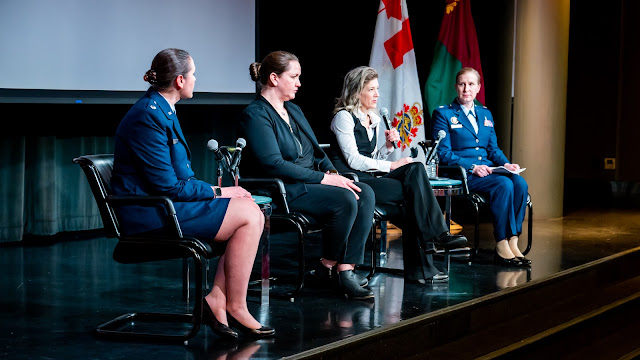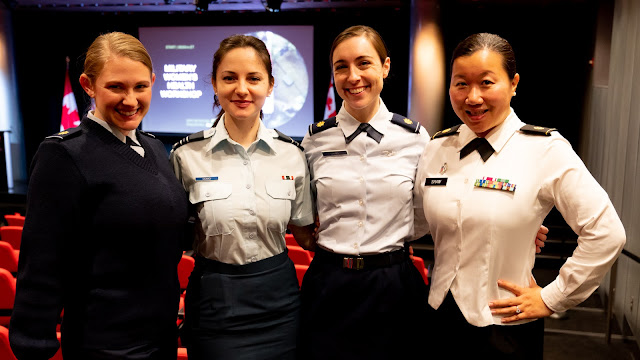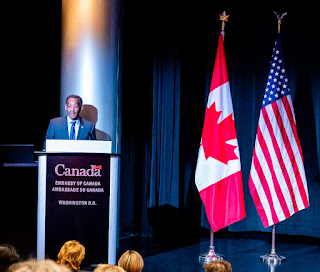USU, Canadian Armed Forces Host Military Women’s Health Workshop
By Sarah Marshall
The Uniformed Services University (USU) partnered with the Canadian Armed Forces Health Services (CAFHS) to co-host the first International Military Women’s Health Workshop to advance research on women’s health issues and to optimize care for women in uniform. The workshop was held Feb. 1.
More than 500 attendees from six countries participated in the hybrid event, which was held at the Canadian Embassy in Washington, D.C., and streamlined live online. The event’s lead organizers – USU’s Air Force Col. (Dr.) Amy Costello and CAFHS’s Lt. Col. (Dr.) Carlo Rossi, explained that the workshop grew from an increasing awareness over the past several years that there is room for continued growth in supporting the unique health care needs of women who are serving in the Armed Forces. The event allowed women’s health experts from across the globe to exchange best practices. It was also an opportunity to foster collaboration between military allies while capitalizing on each other’s work in the field, as part of an overall effort to enhance women’s health in their respective military health systems.
After welcoming remarks from Canadian Ambassador Kirsten Hillman and several key leaders from the U.S. Military Health System and the CAFHS, the event kicked off with a series of panel discussions on various women’s health issues, such as reproductive health, women’s mental health, and operational women’s health, as well as panels on how to best implement their efforts and take further action.
About 50 years ago, women made up just 2% of U.S. enlisted military forces and about 8% of officers. Today, they make up about 16% of enlisted forces and about 19% of the officer corps, noted Dr. Jonathan Woodson, USU president.
“It goes without saying that having female physicians in healthcare professions matters greatly to women’s health and the diversity of the military forces – and it makes for a much more effective force,” Woodson said.
Woodson said that the workshop offered a platform for experts to address some of the issues and challenges that women face in the Armed Forces in terms of seeking health care, in both the U.S. and Canadian forces, as well as in operational environments, in research, mental health, and overall health and performance.
“I thank you all for what you do and the information that you’re producing to allow us to do our jobs better and to serve U.S. and Canadian female forces,” Woodson said.
Army Lt. Gen. (Dr.) Telita Crosland, director of the Defense Health Agency, echoed similar sentiments. She also noted the growing percentage of women in the Armed Forces, explaining that the evolution of women’s roles in the Armed Forces comes with the responsibility to provide healthcare tailored to their needs – health care that optimizes the mental and the physical wellbeing of women so that they can accomplish the mission and thrive, on and off the battlefield – and not only during their service, but also in terms of their lifelong health.
“Women are the fastest growing percentage in the United States Armed Forces, closing in on almost 20 percent of the total force,” Crosland said. “We cannot expect to achieve and maintain readiness without ensuring their health and wellness … This inaugural event is an opportunity to collaborate, which is essential to our countries’ continued success. Today’s collaboration not only allows us to identify and address key issues impacting women in the military, but it will also spark some ideas and further discussion that will translate into action.”
Canadian Surgeon General, Maj. Gen. Marc Bilodeau, also expressed the importance of maintaining readiness through a system that supports health and wellness for all members.
“To support Canadians at home, to support our likeminded allies, we need to have a healthy, cohesive force,” Bilodeau said. “That outcome starts with how we support all of our military members. Part of this means providing optimal services, such as healthcare and health promotion for women.”
In coordinating and prioritizing these efforts, he added, evidence-based information will be key – and that was part of the impetus for the workshop.
Among the many panelists, Air Force Lt. Col. (Dr.) Leslie Vojta, associate chair for Education in the Department of Military and Emergency Medicine at USU, gave a presentation on operational women’s health. She noted that the workshop’s cross-cultural networking was key, as well as having the opportunity to find creative solutions for problems that are present not just in the North America, but all over the world.
The workshop also placed an emphasis on its academic and military sponsors and organizers, Vojta added, “which reminds us that leadership cares about issues that are specific to women in the military.”
Dr. Mark Kortepeter, vice president for Research at USU, was another panelist who addressed international cooperation, and provided an overview of research at the university.
“You could feel the energy in the room,” Kortepeter said about the workshop. “It is so important that we build this partnership to improve women’s health. We face the same challenges and this was an ideal opportunity for us to leverage our complementary interests, knowledge, and capabilities to push the envelope.”









